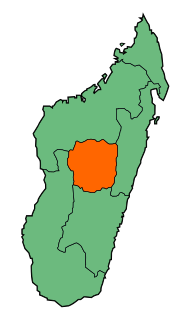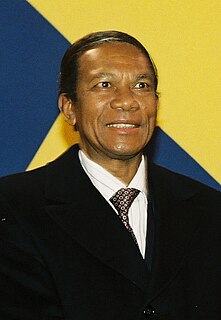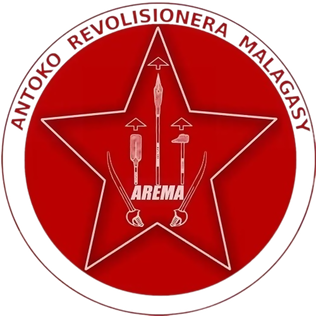
Politics of Madagascar takes place in a framework of a semi-presidential representative democratic republic, whereby the President of Madagascar is head of state and the Prime Minister of Madagascar is head of government, and of a pluriform multi-party system. Executive power is exercised by the government. Legislative power is vested in both the government and the Senate and the National Assembly. The Judiciary is independent of the executive and the legislature.

Madagascar was divided into six "autonomous provinces" :
- Antananarivo Province
- Antsiranana Province
- Fianarantsoa Province
- Mahajanga Province
- Toamasina Province
- Toliara Province

Antananarivo Province is a former province of Madagascar with an area of 58,283 square kilometres (22,503 sq mi). It had a population of 5,370,900 in 2004. Its capital was Antananarivo, which is also the capital of the country. Established in 1965, it was the most important province of Madagascar in terms of industrial production. It was one of the most literate provinces and was dominated by the Merina people. Along with the other five provinces, it was abolished in 2007 after a referendum in favour of creation of smaller regions to help in development was approved. It was badly affected by plagues in the 20th century. In 2002 a state of emergency was proclaimed by the then president Didier Ratsiraka. The events that followed led to the other five provinces announcing the creation of a new republic that would have excluded Antananarivo Province. Peace was restored only when Marc Ravalomanana was installed as the country's president.

The national flag of Madagascar was adopted on 14 October 1958, two years before the independence as they prepared for a referendum on its status in the French Community.

Albert Zafy was a Malagasy politician and educator who served as President of Madagascar from 27 March 1991 to 5 September 1996. In 1988, he founded the National Union for Democracy and Development (UNDD).

Didier Ignace Ratsiraka was a Malagasy politician and naval officer who was President of Madagascar from 1975 to 1993 and from 1997 to 2002. At the time of his death, he was the longest-serving President of Madagascar.

The Malagasy Revolutionary Party, better known by its Malagasy acronym AREMA, is a political party in Madagascar. It was the ruling party of the Democratic Republic of Madagascar, a Marxist–Leninist one-party socialist state, from 1976 to 1992.

Iarovana Roland Ratsiraka is a Malagasy politician.
Manandafy Rakotonirina was a Malagasy politician. He had been a significant political figure in Madagascar since the 1970s, and in April 2009 he was appointed as Prime Minister by ousted President Marc Ravalomanana.

The Malagasy Republic was a state situated in Southeast Africa. It was established in 1958 as an autonomous republic within the newly created French Community, became fully independent in 1960, and existed until the proclamation of the Democratic Republic of Madagascar in 1975.

Presidential elections were held in Madagascar on 3 November 1996, with a second round on 29 December 1996. The election followed the impeachment of incumbent President Albert Zafy and the appointment of his interim successor, Norbert Ratsirahonana.

The Democratic Republic of Madagascar was a socialist state that existed on the island of Madagascar from 1975 to 1992.
Ratsiraka is a Malagasy surname. You may be looking for:
Guy Willy Razanamasy was a Malagasy politician who served as Prime Minister of Madagascar from 1991 to 1993.

A constitutional referendum was held in Madagascar on 21 December 1975. The new constitution created a presidential republic, with the president serving seven-year terms and incumbent President Didier Ratsiraka was to serve the first term without being elected. It also created a High Revolutionary Council to create a "socialist revolution" and a military committee to oversee socio-economic development. Madagascar was transformed into the Democratic Republic of Madagascar. All political parties with the exception of those "loyal to the socialist revolution" were to be banned, and those that were allowed to exist would have to be affiliated with the National Front for the Defense of the Revolution, which was led by Ratsiraka's AREMA party.

The Charter of the Malagasy Socialist Revolution was the guiding document of the Democratic Republic of Madagascar, established by the "Red Admiral" Didier Ratsiraka, President of Madagascar and head of the Supreme Revolutionary Council from 1975 to 1993. The Charter was commonly known as the Red Book or the Little Red Book due to the colour of the standard issue's cover (and in possible reference to the Quotations from Chairman Mao Tse-tung, known popularly as Mao's Little Red Book).

Marie Gisèle Aimée Rabesahala was a Malagasy politician and activist who was the first woman to hold a ministerial position in the government of Madagascar. She entered politics at the age of 17, campaigning on behalf of political prisoners, and becoming Madagascar's first woman municipal councilor, before becoming the first Malagasy woman to establish and lead a political party. She was a committed Marxist and co-founded the communist Congress Party for the Independence of Madagascar, which took power in 1975. In 1977 she became Madagascar's first female minister, responsible for promoting revolutionary art and culture, but lost her job in 1991 when her ministry was abolished in the course of Madagascar's return to multi-party democracy. She remained an active political campaigner and journalist until her death in 2011.

Canada–Madagascar relations are foreign relations between Canada and Madagascar. Both countries are full members of the Francophonie, United Nations and the World Trade Organization.
Céline Marthe Ratsiraka is a Malagasy politician, political figure, and widow of former President Didier Ratsiraka. Ratsiraka is the longest tenured First Lady of Madagascar in the country's history, having held the position from 1975 to 1993 and from 1997 until 2002. She was an influential figure within the ruling Association for the Rebirth of Madagascar (AREMA) from the 1970s to the 1990s, especially within the party's left-wing.
The 2002 Malagasy Political Crisis covers the period of mass protests and violent conflict following a dispute over the results of the 2001 Malagasy presidential election. It took place in Madagascar between January-July 2002 and ended with the swearing-in of President Marc Ravalomanana and flight of former president Didier Ratsiraka.










